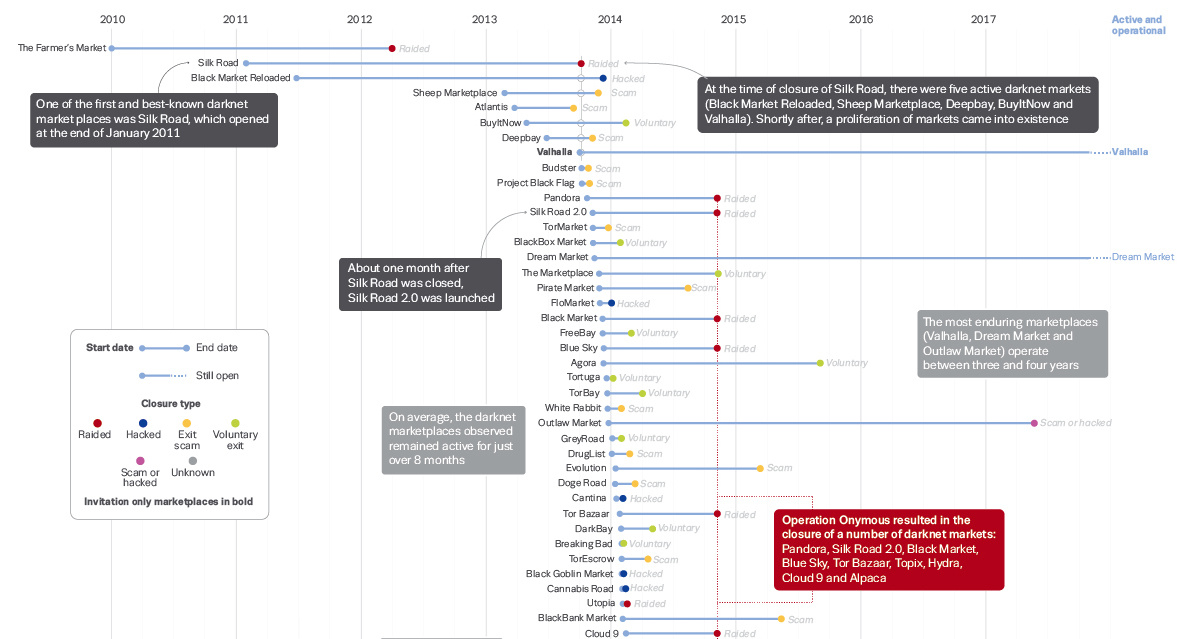Lately, the deep web has captured the imagination of many, becoming a topic of fascination in both popular culture and media narratives. Often portrayed as a shadowy underworld filled with illicit activities, the dark network hosts a variety of marketplaces that operate beyond the grasp of conventional regulation. These venues provide a platform for buying and selling goods and services that would typically be considered prohibited, spanning drugs and firearms to hacked information and forged money.
As we investigate the mysterious world of darknet marketplaces, it is crucial to grasp not only the essence of the transactions occurring but also the underlying systems that maintain them. Veiled behind layers of coding and secrecy, these sites thrive in the darkness, defying law enforcement and traditional businesses alike. By examining dark markets 2026 of these venues, we can begin to decode the complex web of driving forces, dangers, and rewards that define the dark web's singular marketplace.
Comprehending the Deep Web Ecosystem
The dark web is a part of the internet that is typically not cataloged by standard search engines, which creates it a secret realm for many individuals. This portion of the web operates on overlay systems that require specific software, including Tor, to access. In this isolated environment, concealment is paramount, allowing individuals to participate in activities that span from the innocuous to the criminal. The dark web serves as a venue for multiple goods and services, serving a varied community seeking discretion and discretion.
Within the deep web, markets prosper, offering everything from illicit drugs to hacked data and hacking services. These platforms vary in sophistication, with some operating like conventional e-commerce platforms, including reviews and marketplace ratings. The transactions typically use cryptocurrencies to further enhance anonymity and security for both buyers and providers. This creates an atmosphere where trust mechanisms rely heavily on user connections rather than formal regulations or supervision.
Another essential aspect of the dark web ecosystem is the role of communities and communities. These spaces are typically designed for sharing information, knowledge, and guidance related to dark web activities. Individuals can disperse knowledge about navigating markets, safety protocols, and preserving anonymity. This interdependence fosters a feeling of community, enabling it easier for beginners to engage and find their place while at the same time expanding the market's reach and impact.
Anatomy of Dark Web Marketplaces
Underground marketplaces are hidden platforms on the darknet where individuals can exchange goods and services, often involving unlawful activities. These markets typically function using privacy-enhancing tools like Tor, which hides users' identities and locations. Consumers and sellers participate through anonymous accounts, creating an environment that is both enticing and dangerous. The transactions are primarily executed using cryptocurrencies to enhance confidentiality and minimize the risk of tracking funds.
The structure of dark web marketplaces usually mirrors that of traditional online shopping platforms, showcasing sections for various products ranging from narcotics and counterfeit papers to hacking offerings and illegally obtained information. Each product entry often features customer reviews, photos, and thorough information. This degree of client input fosters confidence within a network where dependability can often be elusive. In addition, many of these platforms provide escrow options that retain payments until buyers verify delivery of their purchases, adding a level of protection to the process.
The dynamic character of underground markets is shaped by law enforcement actions and internal market shifts. Some marketplaces may thrive for long periods before facing takedowns or frauds that lead them to collapse. New competitors constantly appear, aiming to occupy the void created by fallen giants. Developments and adaptations within these markets keep users involved, as sellers find creative ways to evade capture while catering to the insatiable demand for illegal goods and offerings.
Risks and Ethical Consequences
Engaging with darkweb platforms presents significant risks to users, both. The anonymity that these platforms offer can quickly turn into a mixed blessing. Participants face exposure to scams, as numerous sellers may not fulfill promised goods, leaving customers vulnerable to monetary damage. Furthermore, there is the persistent risk of law enforcement watching these markets. Even casual browsing can lead to unintended legal repercussions, putting individuals at jeopardy of legal action, especially in jurisdictions with strict anti-drug and anti-trafficking laws.
Beyond individual threats, there are broader ethical implications associated with deep web platforms. These markets often enable the trade of illicit products and services, including drugs, firearms, and illegally obtained information, contributing to a variety of community harms. This not only endangers participants who participate but also impacts communities through higher criminal activity and public health issues. The ethical debate surrounding the deep web raises concerns about the balance between privacy, freedom of expression, and the possible for damage, positioning these platforms within a complex ethical context.

Additionally, the deep web can serve as a haven for criminal conduct, which raises serious challenges for law enforcement and regulators. The anonymity provided by these marketplaces makes difficult the enforcement of regulations designed to safeguard society from dangerous goods and services. As deep web platforms continue to evolve, the need for robust legislative frameworks and moral considerations becomes more urgent, prompting ongoing debates about how to tackle these challenges while respecting personal freedoms and liberties.

